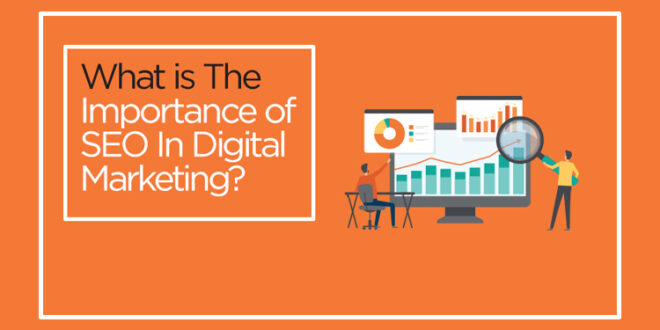Understanding and leveraging search engine optimization (SEO) is a fundamental element of digital marketing, empowering companies to boost their online presence and engage with a broader audience. Securing a good ranking in search results is key to driving traffic and prospective clients. In this piece, we will examine the significance of SEO is important for digital marketing and its operations.
Why SEO is Important for Digital Marketing? Everything to Know
SEO enhances customer and business experiences by amplifying visibility and internet traffic, augmenting the purchasing cycle, among other things. Let’s take a moment to delve into each of these aspects.
1. Improved Visitor Experience
The user experience (UX) and ease of navigation on your website should be paramount considerations, as they influence how your customers perceive your brand. If your customers find everything they need or a substantial portion of their requirements readily accessible, they are likely to recommend your brand, thus bolstering your online presence.
A critical factor for a superior user experience is the speed at which your webpages load. Ideally, your site should load within three seconds to maintain customer engagement and boost conversion rates.
It’s a given that your site’s visitors seek a fluid and exciting experience, hence the responsiveness of your site and the speed of page loading can significantly influence their impressions.
2. Visibility and Rankings
One of the key benefits of a robust SEO strategy is its ability to elevate a website’s rank on Google’s search engine result page (SERP), thereby increasing its visibility. There exists a direct correlation between visibility and rankings.
Consumers naturally gravitate towards pages that rank higher, to the point that nearly 25% of web users seldom venture beyond the first SERP. Consequently, SEO endeavors demand ongoing attention and must be efficient.
3. Web Traffic
Greater visibility and rankings lead to increased web traffic, which is a vital objective in SEO. Consider the following search data:
32 out of 100 individuals will click on the first SERP
An upward shift in search results by one position can boost the click-through rate (CTR) by 30.8%
The Featured Snippet enhances organic click-throughs by outshining even the #1 SERP
The takeaway here is that your SEO strategies should aim to position your page within the top 5 rankings, ideally at the top spot.
4. Page Authority
Page Authority (PA) denotes the trustworthiness, quality, and value of your website. A higher authority corresponds to a higher PA score, on a scale from 0 to 100, and vice versa.
There are numerous tools, like Moz, to assess this, though changing them can be challenging. Nonetheless, many SEO experts propose that receiving external links from reliable and heavily trafficked sources can influence PA.
5. Buying Cycle
Implemented correctly, SEO can positively impact the buying cycle. The goal is to utilize SEO strategies to convey your messaging about excellent deals and innovative products or services.
Demonstrate to your audience the reliability and relevance of your services. It’s worth noting that the above necessitates constant research. These are the factors that underline the importance of SEO for digital marketing. The next section will briefly explain the key components of SEO.
Five Important Elements of SEO Marketing

Individual Typing on Laptop | Unveiling the Significance of SEO for Digital Marketing: Everything You Need to Know
These components effectively transform SEO into a tool for driving sales and conversions, capitalizing on the benefits discussed earlier. It’s crucial to diligently apply these strategies to fully harness the power of SEO.
1. Search Engine Marketing
Often abbreviated as SEM, search engine marketing encompasses all paid marketing activities, including:
Google AdWords
Social media advertisements
Pay-per-click (PPC) campaigns
Google shopping ads
Display advertisements
Targeted paid campaigns
Although SEM is not always integrated into an exhaustive SEO strategy, it holds considerable value in connecting with new and highly specific audiences.
Moreover, it’s entirely possible to synchronize SEO and SEM to function harmoniously. SEO can be viewed as the foundation, and SEM as the branches of a tree. Therefore, it’s essential to establish your SEO credibility to persuade Google of your website’s authenticity and then effectively leverage your SEM strategies.
2. Keywords
Most of us who comprehend keywords understand that they were once almost the sole determinant in SEO. However, the narrative has slightly shifted now, albeit keywords remain crucial.
So, why exactly do we use keywords on our website? The purpose of keywords is to address user queries or guide them to the products or services they’re seeking.
Users input keywords according to their intent, and it’s advisable to focus on those terms most frequently searched—those with high search volumes and low competition. Such keywords are easier to rank as they generate more clicks and face less competition.
Furthermore, it’s critical to bear in mind the following:
- Utilization of short-tail, long-tail, and local keywords.
- Optimization of these in titles, URLs, and other on-page SEO elements.
3. Content
For example, if you operate in the finance sector, you might consider creating blogs about investing, managing debt, tax advice, and more. This strategy ensures your content reaches your target audience, providing them valuable information and fostering a relationship.
But the story doesn’t end there.
Once such trust is established with your potential clients, their likelihood of seeking your (financial) services increases since they are now familiar with the quality of your content.
Content is a vital aspect of SEO; it should be informative, relevant, engaging, and share-worthy.
Various types of content can be leveraged, including:
E-books and whitepapers
Social media updates
Website content
Instructional guides
Local Listings
Infographics
Podcasts
Listicles
Blog posts
By integrating keywords into these content pieces, your visibility will improve.
4. Local SEO
For example, if you operate in the finance sector, you might consider creating blogs about investing, managing debt, tax advice, and more. This strategy ensures your content reaches your target audience, providing them valuable information and fostering a relationship.
But the story doesn’t end there.
Once such trust is established with your potential clients, their likelihood of seeking your (financial) services increases since they are now familiar with the quality of your content.
Content is a vital aspect of SEO; it should be informative, relevant, engaging, and share-worthy.
Various types of content can be leveraged, including:
E-books and whitepapers
Social media updates
Website content
Instructional guides
Local Listings
Infographics
Podcasts
Listicles
Blog posts
By integrating keywords into these content pieces, your visibility will improve.
5. Off-Page SEO
Beyond on-page SEO (which is indispensable), off-page SEO concentrates on external optimization practices performed outside your website.
Off-page SEO involves a process known as backlink building, which refers to acquiring high-quality backlinks from external sites. This communicates to search engines that your site is of high quality and value, thereby bolstering authority.
Here are three tactics for effective backlink building:
Guest blogging
Influencer marketing
Generating shareable infographics in abundance
Cross-reference: Confused by digital marketing? Navigate through the labyrinth
How does SEO work in Digital Marketing?
For a more comprehensive understanding of how SEO operates within the realm of digital marketing, it’s beneficial to divide it into three fundamental components.
Technical Optimization: This refers to non-content related actions devised to enhance SEO and executed primarily behind the scenes.
On-Page Optimization: This component involves the strategic use of keywords and content within a website, along with ensuring an excellent user experience. These tasks can be readily executed via content management systems such as WordPress, Wix, Joomla, and others.
Off-Page Optimization: This segment of SEO entails activities beyond the website designed to boost search engine rankings. In off-page optimization, backlinks are utilized to establish the website’s reputation.
These elements collectively form the SEO framework and can significantly amplify your digital footprint. To summarize, the five critical elements of SEO marketing are Search Engine Marketing, Keywords, Content, Local SEO, and Off-Page SEO. Additionally, page load speed is a critical factor in retaining visitors on a website.
Read More Articles: Top Digital Payment Banks & E-Wallets In India




